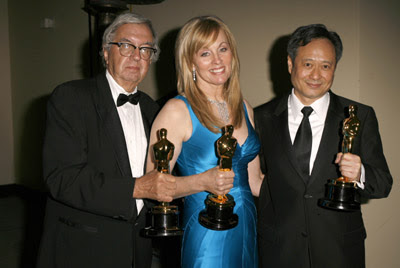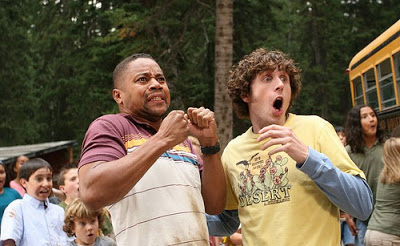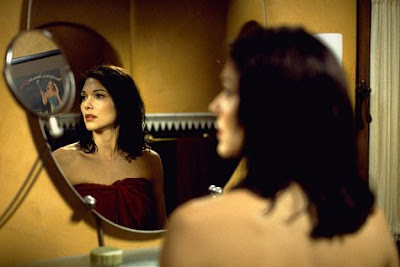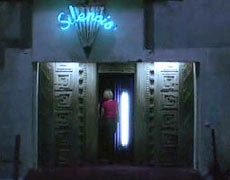Neuroscience

...in the movies!

ADDENDUM [and note that NONE of these comments apply to The Neurocritic]:

Laura Elena Harring in Mulholland Dr.
Silencio!

- Do Professional Movie Critics Evaluate Films The Same Way As The Rest Of Us?
If you want to know whether you're going to enjoy a movie, the opinion of professional film critics might not be the best place to find out. Jonathan Plucker and colleagues compared the ratings given to films by professional critics, "amateur critics",...
- Alzheimer's Disease: Sarah Polley's Movie, Away From Her
In continued postings here about Away From Her, I note that Julie Christie and Sarah Polley have just been nominated in Academy Award categories Best Actress and Best Adapted Screenplay, respectively. The screenplay was adapted from a short story written...
- Alzheimer's Disease: Sarah Polley's Movie, Away From Her
Sarah Polley has won another award for her movie: From The Vancouver Sun: Polley wins N.Y. film critics award CanWest News Service Published: Tuesday, December 11, 2007 Canadian filmmaker Sarah Polley has won the New York Film Critics Circle's best...
- Alzheimer's: Sarah Polley's Movie, Away From Her
From Australia's National Nine News: Alzheimer's struggle brought to screen Friday Sep 21 08:19 AEST At just 28 years of age, Canadian director Sarah Polley has made a debut feature film that directors twice her age and experience would be proud...
- Cool Video Site
Check out Open-Video.org! The content includes 30-60 minute movies from the early 1900s (including silent films!), almost 500 documentaries from NASA, the Digital Himalaya Project from the 1930s, advertisements from the 1950s, CHI materials from the Ass'n...
Neuroscience
The Secret To My Success...

The 78th Annual Academy Awards (2006) - Larry McMurtry, Diana Ossana, Ang Lee
...in the movies!
Study Analyzes Secrets to Movie SuccessYou mean Daddy Day Camp won't be nominated for an Oscar?
Associated Press - August 17, 2007
. . .
Films that earn awards and praise from reviewers tend to be R-rated and based on a true story or a prize-winning play or novel, says professor Dean Simonton. The original author or the director usually have written the screenplay.
Big-budget blockbusters - whether they're comedies, musical, sequels or remakes - don't ordinarily draw acclaim, Simonton found. Neither do summer releases, PG-13 movies, movies that open on thousands of screens or ones that have enormous box office numbers in their first weekend.
. . .
"I had this hope that there was a difference between blockbusters and really great art films - films that can be considered great cinematic creations," said Simonton, who presented his findings Friday at the annual meeting of the American Psychological Association in San Francisco. "It was gratifying to find out they're very, very different and you can find out what's different about them."
. . .
"Brokeback Mountain" is a prime example of what Simonton discovered. It was rated R, had an 87 percent approval rating on the Metacritic.com Web site and it came out at the height of prestige-picture time in December 2005. It featured a top-notch creative team, including director Ang Lee and screenwriters Larry McMurtry and Diana Ossana, working from a short story by Pulitzer Prize winner Annie Proulx. The film cost $14 million to make and grossed nearly $175 million worldwide. It was nominated for eight Oscars and won three.

ADDENDUM [and note that NONE of these comments apply to The Neurocritic]:
"Critics are academic types who want to prove how smart they are. They're professional grouches who think a critic's job is to be critical," said [Tom] O'Neil, columnist for theenvelope.com Web site. "Unfortunately, great critics tend to be social misfits with extraordinary powers of observation. Being misfits, they tend to bash sentimental movies because they remind them of a loving, nurturing world to which they do not belong."

Laura Elena Harring in Mulholland Dr.
A great example of this, he said, came in 2002. The best-picture winner at the Oscars was Ron Howard's uplifting "A Beautiful Mind" (which was based on a prize-winning book about a true story) but several critics' groups gave their top honors to David Lynch's dreamlike "Mulholland Dr."
"Even though," O'Neil points out, "David Lynch said publicly he had no idea what the movie was about."
Silencio!

- Do Professional Movie Critics Evaluate Films The Same Way As The Rest Of Us?
If you want to know whether you're going to enjoy a movie, the opinion of professional film critics might not be the best place to find out. Jonathan Plucker and colleagues compared the ratings given to films by professional critics, "amateur critics",...
- Alzheimer's Disease: Sarah Polley's Movie, Away From Her
In continued postings here about Away From Her, I note that Julie Christie and Sarah Polley have just been nominated in Academy Award categories Best Actress and Best Adapted Screenplay, respectively. The screenplay was adapted from a short story written...
- Alzheimer's Disease: Sarah Polley's Movie, Away From Her
Sarah Polley has won another award for her movie: From The Vancouver Sun: Polley wins N.Y. film critics award CanWest News Service Published: Tuesday, December 11, 2007 Canadian filmmaker Sarah Polley has won the New York Film Critics Circle's best...
- Alzheimer's: Sarah Polley's Movie, Away From Her
From Australia's National Nine News: Alzheimer's struggle brought to screen Friday Sep 21 08:19 AEST At just 28 years of age, Canadian director Sarah Polley has made a debut feature film that directors twice her age and experience would be proud...
- Cool Video Site
Check out Open-Video.org! The content includes 30-60 minute movies from the early 1900s (including silent films!), almost 500 documentaries from NASA, the Digital Himalaya Project from the 1930s, advertisements from the 1950s, CHI materials from the Ass'n...

